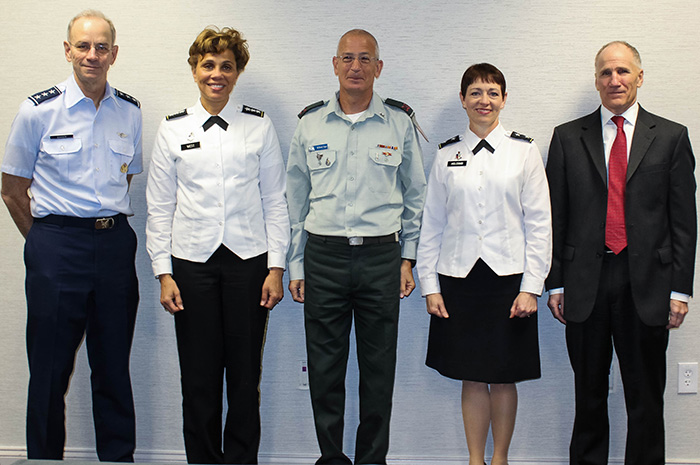USAMRMC Hosts Israeli Defense Force at 18th Shoresh Conference

United States and Israeli military medicine representatives gathered in Rockville, Maryland, March 27-29, to exchange information on current and future medical research at the 18th U.S. and Israel Defense Forces Shoresh conference. This year, over 60 researchers and medical professionals traveled from Israel to participate, as well as over 300 attendees from all across the United States.
U.S. Army Medical Research and Materiel Command and Fort Detrick Commanding General Maj. Gen. Barbara R. Holcomb hosted this year's event, and it was co-sponsored with Israeli Defense Forces Surgeon General Brig. Gen. David J. Dagan. Distinguished attendees included Surgeon General of the U.S. Army and Commanding General, U.S. Army Medical Command, Lt. Gen. Nadja Y. West; U.S. Navy Bureau of Medicine and Surgery Executive Director Dr. Michael P. Malanoski; and U.S. Air Force Surgeon General Lt. Gen. Mark A. Ediger.
"The Shoresh conference has been an important exchange between our two nations that has allowed for years of active discussion on a broad spectrum of military medical research topics," said Col. Andrea Stahl, director of the USAMRMC Chemical Biological Defense Program Defense Medical Research Coordinating Office and moderator at this year's event. "Although the conference began as a chemical and biological research exchange, we've expanded significantly over the past few years. The conference is now an important venue for discussing topics as diverse as combat casualty care, military operational medicine, infectious disease, and victim identification and forensics."
This year's three-day conference established a total of eight working groups to discuss research and collaboration: chemical, biological, radiological and nuclear defense; infectious diseases; post-traumatic stress disorder and behavioral sciences; physiological stress; combat casualty care; naval medicine; forensic pathology/identification of victims of mass casualty events; and aerospace medicine.
"The addition of working groups has allowed for a comprehensive and inclusive approach to supporting Warfighter needs, and has greatly enhanced overall scientific exchange," said Stahl.
The Shoresh conference has been held 17 previous times since 1988 and has gradually increased its scope with each passing event as continual positive results and contributions to research are generated as a product of the conference.
"This conference is mission critical to the readiness of our militaries and our international partnership," emphasized Holcomb during her morning remarks. "Shoresh has proven to be a valuable resource for us to bring together top scientists and researchers from both countries in order to find medical solutions to threats our military forces face."
This meeting is the key event under the U.S./Israel Data Exchange Agreement, "Military Medicine." Throughout the year, numerous collaborations are conducted and updates are provided through video teleconferences, status reports, e-mails and phone calls. This meeting provides an unparalleled opportunity to focus planning efforts and develop collaborations for the future.
"There's no question that we can achieve better outcomes in all areas through collaborative efforts," said West.
Recurring focus throughout the morning presentations revolved around multi-domain battle, an emerging Army concept of future warfare that has gotten traction with all four armed service branches. The concept of multi-domain battle, briefly, envisions the military working together; a not-so distant future picture of warfare that will challenge brigade combat teams and higher command across all domains: land, sea, air, space, cyberspace and the electromagnetic spectrum.
"Our future is unknown and unknowable. I think it is extremely important for us to understand what the expected environment is going to be in the future so we can make sure our researchers are looking at the right elements and the right types of capabilities to be successful in that type of environment," continued West. "We, as medical professionals, need to be agile and adaptable. The centerpiece of the multi-domain battlefield is the Service Member."
Partnership and collaboration rang loudly as the overall resounding message behind this year's 2017 Shoresh event. Challenges are really just opportunities, and from the look of this year's agenda there were great opportunities for cooperative research between nations.
"The commonalities are far more than the differences, whether we are talking about services or talking about countries," said Malanoski. "We can't get to where we want to go unless we have the support of partners both inside the United States and outside. It is critical to our success that we strengthen these relationships and that we ensure that there is free flow of information to improve the end product. That end product is not a product at all; it is an individual: a Sailor, Marine, Airman or Soldier."
"By working together today, we avoid duplication of effort and are able to share all of the information that we gather," said Ediger. "By sharing our research priorities we can gain the knowledge that will help us support our militaries going forward."
 An official website of the United States government
An official website of the United States government
 ) or https:// means you've safely connected to the .mil website. Share sensitive information only on official, secure websites.
) or https:// means you've safely connected to the .mil website. Share sensitive information only on official, secure websites.


